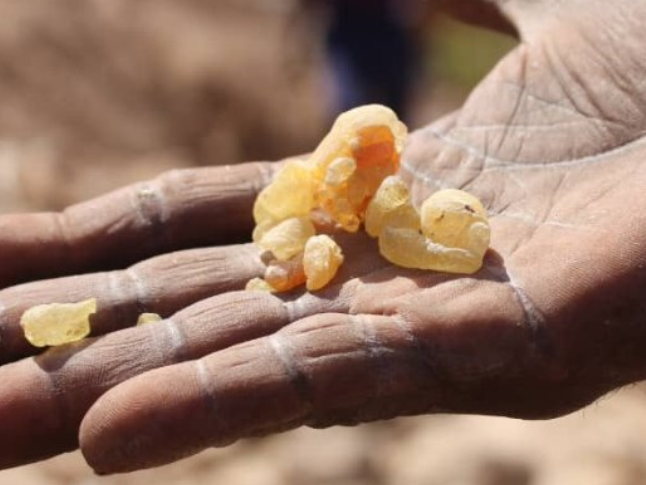Keeping the trade in frankincense fair

FairWild certification of Frankincense Boswellia frereana in Somaliland. Credit - Violet Wambui.
Certifying sustainable frankincense through a global value chains approach
Across the Sahel and beyond, into Ethiopia and southern Arabia, wild trees of the genus Boswellia bear cut-marks on their bark. Local people from a diverse array of ethnic groups, nationalities, and traditions make these marks at great effort in challenging conditions. Days after the bark is cut, groups return to the cuts they have made. These may be Samburu women in Kenya, or semi-nomadic herder men in Somalia. They break off the honey-coloured tears of resin which have oozed from the wound. This is frankincense, both semi-mythical and a major global commodity. Once sold and processed, it will find its way into luxury cosmetics, essential oils, and perfumes in distant, richer countries. The income from this trade will keep the collectors and their families fed, but only for as long as the trees last.
Our project is ensuring that they do. The project ‘Certifying Sustainable Frankincense Through a Global Value Chains Approach’, led by FairWild, is collaborating with the private sector to bring about change in this old and competitive industry.
Norms are slow to change in this market, where collaboration within the secretive private sector is rare, and weak range state governments are often unable to bring about change. As a result, the frankincense sector is full of allegations of human rights abuses and environmentally unsustainable practices. In recent years, some of these allegations have become widely publicised scandals, such as that surrounding Somali exporter Asli Maydi, which had been selling resin produced by highly exploited harvesters to buyers around the world. In addition to the allegations, overharvesting is occurring in some areas. Where too many incisions into the bark are made too often, trees can be harmed. Rising global demand for frankincense collides destructively with a fixed wild supply. The status quo incentivises harvesters to cut corners with their collection practices, suppliers to exploit their harvesters, and overseas buyers to look the other way.

Our project is pushing for the FairWild certification and comparable schemes to become the new industry norm; a baseline set of expectations about environmental and social practices that are reinforced and maintained by economic pressure as much as by good will. Certification entails annual on-site observations of harvesters, trees, and business practices, providing assurance that frankincense is produced ethically and sustainably. Normalising and mainstreaming ethical and sustainable practices in an industry with such complex supply chains calls for more than only using our grant funding to implement certification pilots.
To change expectations, the project partners needed to reach out to industry. We achieved this by promoting the importance of sustainable sourcing to Global North buyers at trade fairs, slowly working our way into networks of suppliers in East Africa, and producing communications materials to educate consumers. The two-year Darwin Initiative Innovation project requires more time to fully realise this industry-changing goal. This means that project partners are increasingly partnering directly with large companies in the frankincense sector to improve their supply chains.
FairWild is currently working with some of the largest companies in the global frankincense sector to help them transition to ethical and sustainable sourcing. Large companies based in the Global North have financed the FairWild certification of a number of their suppliers in East Africa. Within and beyond the bounds of the project area, thousands are now protected against unfair pay, coercion, and other issues that are systemic in the trade. Landscapes are also protected from overharvesting and the overzealous extraction of other resources, especially firewood, as all of these resources are closely monitored in the annual third-party audits. As certification is based on these regular audits, the maintenance of improved ethical and ecological standards in the region is ensured long after the project’s end.
When communities have an economic stake in the landscapes that surround them, conservation can transform from a series of restrictions imposed – and funded – by outsiders, to a consensual and self-reinforcing relationship with nature. The Boswellia species dominated shrublands of Somalia and Kenya are becoming more lucrative intact than degraded. Accordingly, communities that see value in preserving their stake are less likely to prioritise fuel and fodder extraction from these landscapes.
To sustainably commercialise natural capital, partnerships with the private sector are a pathway to long-term impact, as these collaborations can bring with them valuable insights as well as financial support. Provided that commercialisation has the guardrails to ensure a low socio-ecological impact, and that planners are realistic about the potential market for the resources in question, projects such as this one could contribute to local livelihoods and ecological health long after their final report is due.
Written by Jamal Rowe-Habbari. For more information on this Darwin Initiative Innovation project DARNV021, led by The FairWild Foundation, please click here.


 Back
Back